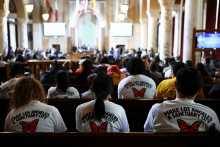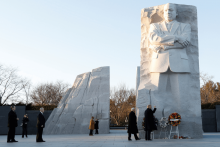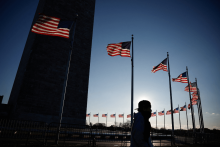Opinion

In the weeks leading up to the inauguration, Sojourners’ 41st class of fellows gathered to study bell hooks’ prophetic book All About Love . In her writing, hooks not only exposes the structures underpinning systems of oppression but illuminates paths toward dismantling them. Her primary tactic is one we don’t hear much about these days: love.
Published in 1999, All About Love could just as easily have been written amid today’s political upheaval. Hooks calls out fear as a defining issue of our time: “As a culture we are obsessed with the notion of safety. Yet we do not question why we live in states of extreme anxiety and dread. Fear is the primary force upholding structures of domination.”

I’ve been caring for the dying since I was 22 years old. Before the rise in death doula work, I was a caregiver for my mother, who died of primary peritoneal carcinoma at 58 –years old. I sat with her during her chemotherapy appointments. I took notes at appointments with doctors. I created a rapport with her medical team so that I could be in the best position to advocate for her up until the very end.

The fight to save the planet isn't over yet, but it will look different under Trump. Can Christians lead the charge?

With Trump’s blessing, Elon Musk’s Department of Government Efficiency has created an unprecedented crisis at an agency that oversees lifesaving assistance to some of the poorest and most vulnerable people in the world. Despite issuing limited humanitarian waivers, the administration has frozen nearly all new foreign assistance funding for the next 90 days, fired many senior leaders, and put the entire agency’s staff of more than 10,000 people on leave, two-thirds of whom work in field locations around the world.

This January, Trump was once again sworn in as president of the United States, propelled to office by the unwavering support of countless evangelical Christians.
For me, the results of the 2024 presidential election felt like the punchline to an incredibly cruel joke. I grew up in the church and still remember the lessons taught to me by my old mentors. I was told that following Jesus meant that truth mattered, justice mattered, how I treated women mattered, and how I treated my neighbor mattered. Later, when I came out as a gay man, my Christian peers insisted that I put aside my personal feelings and desires in the name of biblical fidelity. I spent years of my life making painful and irreversible sacrifices in order to do what I thought was right at the time. Then Trump came along, and suddenly the narrative changed — truth was pliable, character was irrelevant, and justice was getting in the way of “winning.”

In an interview with Fox News, Vice President JD Vance claimed that the old Christian teaching of "ordo amoris" justifies the Trump Administration's treatment of immigrants. But a closer look at the writings of Augustine show that "ordo amoris" doesn't mean what Vance claims it does. In fact, it teaches almost the exact opposite.

Trump's barrage of executive orders, policy decisions and campaign appointments is overwhelming in its extremism. It is designed to provoke a feeling of panicked helplessness among those who oppose his plans for immigrants, LGBTQ+ people, and other targets of his vision for our country. But we do not have to give Trump what he wants and, by staying rooted in our faith, can undermine his campaign of shock and awe.

Democratic Party leadership presented the 2024 presidential election as a choice between Donald Trump and democracy. That messaging seemed not to resonate with the majority of voters as Trump is now president. Despite his extreme policy stances, Trump captured nearly two-thirds of the Christian vote. Trump and his ilk will accelerate the nation’s lurch toward authoritarianism, Christian nationalism, and fewer rights for already marginalized communities. The campaign promises of then-candidate Trump — many of them already being enacted — will devastate millions.

Progressive churches or worship communities often present as accepting places — displaying LGBTQ+ flags or signs on their property or preaching messages that emphasize accepting and affirming LGBTQ+ people. Those are good places to start. But as the U.S. government escalates its discrimination against trans people, it is also necessary that religious communities escalate their support of the trans community. For communities that want to stand in solidarity with trans people, here are five additional action steps that you and your religious community can take.

In this anxious moment, I find it helpful to remember a similar era from the late 19th century, a time when Chinese migrants, under threat of mass deportation, collectively resisted with one of the greatest instances of civil disobedience in U.S. history. Following the passage of the 1892 Geary Act, which continued barring Chinese laborer migration and required all Chinese residents to register as aliens, about 90,000 Chinese — roughly 9 out of 10 Chinese in the U.S. at the time — defied unjust government orders to protest their racial treatment.

As we enter a second Donald Trump presidency, the stakes could not be higher for undocumented people and asylum seekers in this country. Having promised mass deportations to a degree never attempted in the United States, President-elect Trump’s new border czar, Tom Homan, has signaled that the administration’s cruelty will begin in my backyard — Chicago. What he might not be counting on is organized resistance from labor, faith, and immigration leaders that will attempt to thwart these plans.

The juxtaposition is hard to ignore: President-elect Donald Trump, who launched his political career by questioning — without evidence — the citizenship of our country’s first Black president, will take his second oath of office on the day we remember and honor Rev. Martin Luther King Jr., this country’s greatest champion for civil and human rights. Though I hope and pray Trump’s second term will follow the moral vision we honor every year on King’s birthday, I fear the dream King cast for America is much more akin to Trump’s nightmare.

Since his death, Carter’s remarkable life and numerous accomplishments have been rightly celebrated, including the Camp David Accords, a historic nuclear weapons treaty, major environmental protection legislation, the release of political prisoners, the near-eradication of the Guinea worm, aid in conducting free and fair elections in dozens of countries around the world, and decades of volunteer service with Habitat for Humanity. But despite this impressive legacy, what most inspires me about Carter was how he applied his faith to the messiness of politics, both during his time in the White House and in his many years after — a model that we desperately need today in our increasingly polarized and vitriolic politics.

Awareness months, weeks, and days are the kind of thing that often feel manufactured to get us to buy things: It’s Black History Month in February, so buy anti-racist books or something; it’s Stress Awareness Month in April, so invest in yourself and sign up for a mindfulness meditation class; May 6-12 is National Nurses Week, so buy some stuff and send it to a local hospital. These are all fine things to do, but is that all there is to this? Are awareness months just an excuse to throw some money at a cause? Is it just a convenient hook for journalists to write an article about a certain cause or group of people?

I want to draw a careful distinction between saying that God can use an earthly event like an election to accomplish God’s purposes in the world and the claim that God — not the majority of American citizens who voted in the election this past November — chose Trump to become president.

On Nov. 19, Federal Emergency Management Agency Administrator Deanne Criswell sat before legislators on Capitol Hill and defended the agency from accusations that it responded slowly to hurricanes in the southeastern United States and skipped homes with President-elect Donald Trump signs on their property.
Earlier in November, Criswell said in a statement that a FEMA employee who had told relief workers in Florida to skip houses with signs supporting Trump had been fired. (Other employees later returned to those homes to offer the opportunity to apply for aid, Criswell testified.) This revelation came at a time when conspiracy theories about hurricanes were rampant.

Friends and colleagues have mentioned how the news alert ping of each new nomination can often leave them feeling frozen with dread or just wanting to unplug from the news altogether. I can relate. But I want to offer a better way forward that’s rooted in my values as a Christian — a way to engage that doesn’t leave me feeling trapped in anxiety or resignation.

As a Christian, I spend a lot of time meditating on what it means to love those who have been incarcerated. These people are a specific group Jesus names in Matthew 25:36-40, saying that when we visit people in prison, we’re visiting him. Throughout the Bible, God demonstrates a concern for the marginalized. When Christians meditate on what it means to love our neighbor (Matthew 22:37-39), we shouldn’t only think of those who live next door to us, but also those who are imprisoned. But with literal walls and bars separating the incarcerated population from the rest of society, what does it actually mean to love your incarcerated neighbor?

I always travel home for the holidays. No matter what the challenges — overbooked trains, cross-country road trips through winter snowstorms, a carpool with strangers from college, or crowded airports with angsty TSA agents — I always find a way.
I make this journey because, growing up, these autumnal gatherings were always a source of great joy. I was fortunate to grow up in a home whose greatest holiday struggles were finding enough chairs to seat every beloved guest and sliding in the finicky table extensions to accommodate the full spread of food. We played games, watched football, took long naps, and awoke to the miracle of more food.
For myself and others, these rituals continue today, but the holidays have evolved into an increasingly tense time.

Looking back now, a quarter century later, I see how Tony Campolo’s life shaped my own. When the political operatives of the New Right partnered with Jerry Falwell and other Southern Baptists to use Christian faith to rally a reactionary political movement in the 1970s, Tony understood what was happening.